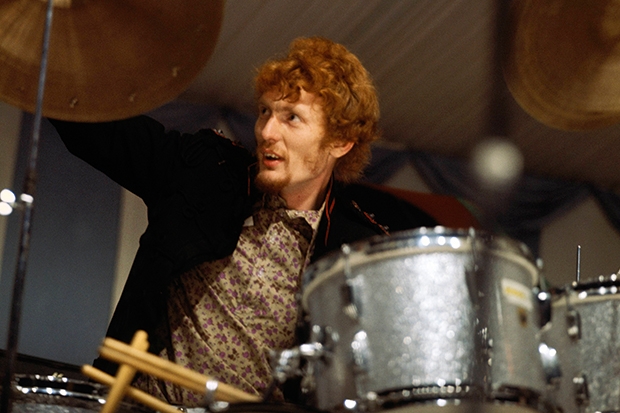Tony Barrell can’t play the drums, but he’s in awe of those who can. ‘A band without a drummer is like a rocking chair that somebody has cruelly bolted to the floor,’ he writes in Born to Drum’s introduction. ‘While it may appear to rock, it actually doesn’t.’ Those who thrill to the sounds of anyone from Black Sabbath to the Buddy Rich Big Band would agree, but Barrell also aims to reach readers to whom names like these mean nothing with an inquiry more psychological than musical, namely: who would be a drummer?
In his first two chapters, entitled ‘Into the Asylum’ and ‘Working-Class Heroes’ respectively, Barrell rolls out the two most prevalent clichés about drummers: they’re the headcases and hod-carriers best relegated to the background, dumbly banging objects together like Early Man. While acknowledging the mental instability of greats like the Who’s Keith Moon and the sheer bloody-mindedness and brawn required to nail down a beat, Barrell instead paints the underappreciated drummer as music’s goalkeeper, the guy you never notice until he screws up.
True enough, but for every dependable timekeeper there’s an incorrigible show-off, hence the need to analyse the dreaded drum solo (or ‘toilet break’, as it’s known to non-drummers). Unlike Cream’s notoriously prolix Ginger Baker, Barrell wisely keeps this bit short. Instead, he examines percussionists through history, from Biblical musicians (‘And David and all the house of Israel played before the Lord on all manner of instruments made of fir wood,’ 2 Samuel 6:5) to the military drummers doing their best to drown out the Paris mob as Louis XVI approached the guillotine. The emcee’s call of ‘drum roll, please’ to ratchet up the tension is not a new idea, it seems.
Though Barrell has interviewed dozens of drummer boys (and girls) to find out what makes them, well, tick, Born to Drum nevertheless reverberates to the sound of a man who’s been dead for 35 years. Led Zeppelin’s drummer John ‘Bonzo’ Bonham is both the hero of the book and its undoing, being a musician of astonishing ability and influence but also a hellraising former brick-layer who drank himself to death at the age of 32. It’s hard not to feel sorry for Barrell when the drummer generally reckoned to be the greatest of them all embodies every stereotype the author has spent 300 pages trying to pick apart.
There are interesting nuggets here —apparently the liberal-baiting former host of a popular motoring show has been known to spend time behind the kit, though doing so obviously failed to be much of an outlet for his aggression — but given the legendary antics of Bonzo, Moony and the rest, there are disappointingly few anecdotes. Without the spark a little rock’n’roll lunacy might add, the book is like that 20-minute drum solo: utterly compelling to a minority, but struggling to connect with even the most devoted music fan after the first few bars.
Available from the Spectator Bookshop, £14.99, Tel: 08430 600033






Comments